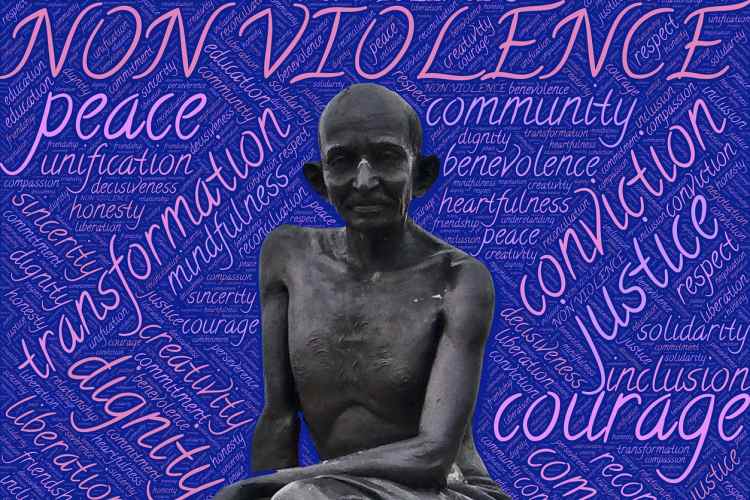On October 2, 1869, Mahatma Gandhi, India’s most famous national leader, was born. Annually, Mahatma Gandhi’s dedication to the Indian Independence Movement is honoured on this day, which is known as Gandhi Jayanti throughout India. In India, Gandhi Jayanti is marked as a national holiday. Mahatma Gandhi advocated and practised nonviolence all through our country’s struggle for independence.
Gandhi Jayanti for kids of today’s generation might be a normal public holiday. They might wish their friends Happy Gandhi Jayanti. But how many kids, in reality, know why Gandhi Jayanti is celebrated as a national holiday? This article is an answer to that question.
Why is Gandhi Jayanti celebrated as a National Holiday?
Gandhiji is considered one of the most quoted leaders of history. He initiated and implemented the philosophy of Satyagraha—resistance through non-violence and is revered throughout India as the nation’s father.
His political ideologies were very different from other political readers. He believed in the ideas of peaceful civil disobedience to liberate India from foreign dominance. He made state-wide efforts to alleviate poverty, extend women’s rights, foster religious and ethnic unity, and abolish the inequities of the caste system.
According to the United Nations General Assembly, Mahatma Gandhi Jayanti is observed around the world as the International Day of Non-Violence. He was regularly imprisoned for his acts, sometimes for years, but he achieved his goal when India attained independence from the British in 1947.
Listed below are some of the ideologies of Gandhiji which still inspires a great number of people.
1. Non-Violence
Gandhiji fought against the world’s most powerful colonial power. He fought Great Britain using his ideology, non-violence. Despite his privilege, he dedicated himself to the poor, the weak, and the defenceless to free them from imperial enslavement.
Even the most powerful governments cannot defeat a united people resolved to plan and control their destiny via following the path of non-violence, as Gandhi demonstrated. He was caught over a dozen times and sentenced to seven years in prison. He was labelled a criminal. Despite being beaten, mistreated, and threatened with death, he persisted.
From generation to generation, his words echoed in the hearts and thoughts of billions of people. As other heroes of goodwill fought for liberty and freedom with the sword, Gandhiji won the battle with unity of love. His daring example of fighting peacefully without fear would set the world alight.
Also read: Lal Bahadur Shastri Quotes & Thoughts for Kids: Learn about India’s Second PM
2. His Contribution as a Freedom Fighter
Gandhi, a lawyer who works in South Africa, battled for racism and civil rights of the native people based on their skin colour. When he returned to India, he and the farmers started protesting against the British’s high tax on property and inequality. He took over the Indian Congress in 1921 and invented the word Swaraj, meaning self-government.
The Dandi March, Quit India, and Civil Disobedience Movement were just a few of Gandhi’s many non-violent protests that hit the Colonial government. He supported a free India practising religious pluralism. The subcontinent’s division into India and Pakistan has led to brutal atrocities on both sides of the border.
In his seventies, Gandhi fasted until his death (Anshan) to stop religious violence. He even argued for Pakistan’s payment of cash assets which many people consider to be too pro-Pakistan and pro-Muslim.
3. Gandhiji and Truth
In terms of truth, Gandhiji believed that truth is everything. His experiences provide a systematic account of how, from childhood to adulthood, from India to South Africa and back to India, in the national freedom struggle and his personal life, and throughout his life, he trod the path of truth and remained firm in his resolve to adhere to the truth.
Gandhi’s beliefs and opinions are deeply rooted in Indian traditions and philosophical sources. He also included the most compassionate aspects of all religious scriptures into his framework of thought.
Truth, according to Gandhi, is by its very nature clear and self-evident; it is the method, instrument, and ultimate purpose all wrapped into one. His understanding of the term goes beyond simply stating the truth; it is something that must be experienced. And the truth is the only thing that exists in reality.
All these are only a few reasons Why Gandhi Jayanti is celebrated as a national holiday. His visions and ideologies are beyond our imagination. A national holiday is an honour to such a great spirit.
Also read: Gandhi Jayanti Quiz Questions and Answers for Kids: Are You Ready to Give Answers?
Gandhiji and The Contemporary World
Gandhi Jayanti 2021 should not be limited to sweet distribution and other celebrations. Parents and teachers should take initiative to teach the significance of Gandhian ideologies and also his role in our nation.
Nonviolence and tolerance take a great deal of strength and patience. In a world that is moving through periods of the war marked by violence and the death of ordinary people due to the threat of terrorism, Gandhi’s notion of nonviolence is becoming increasingly important today than in the past.
All religions were acknowledged by Gandhiji. Gandhiji’s secular beliefs are not only enshrined in the Indian constitution but also serve as a key-value system in Indian culture. That is why India has such a diverse religious community.
Even though he believed in many of the ideologies in hinduism, he respected all religions equally. Even in the 21st century people need to keep all these things in mind as there are an increasing number of religiously and faith-wise accepting people in places where religion is used to justify violence.
Gandhi was opposed to the caste system, which is still forbidden in India. Gandhiji respected all people equally, and he refused to enter temples where lower caste people were not permitted. As a result, Gandhi’s theory is effective in establishing a casteless society in which everyone is treated equally regardless of caste.
Gandhiji put a high priority on cleanliness or Swacchta. ‘ Swacchta Hin Seva,’ he used to say. The Swatch Bharat Abhiyaan, India’s largest cleanliness initiative, aims to realise Bapu’s dream of making India clean. This cleanliness campaign is much more than just physical cleanliness, as Gandhiji stressed the importance of personal hygiene.
As a result, in addition to clean roads and toilets, a clean India necessitates a corruption-free society with increased openness and accountability. Gandhi Jayanti for kids can also be celebrated by encouraging them to clean their surroundings under their parent’s guidance.
Also read: Speech on Gandhi Jayanti for Kids: Sample Speech for Kids
Summing Up
Gandhiji and Gandhianism will stay in the world as long as there is a human race because his ideologies are far beyond time. Gandhism is not something to be included in history, it is something to be practiced in our daily life. Perhaps Nobel Laureate Rabindranath Tagore was aware of this at the time, and he correctly referred to Gandhiji as Mahatma.
Gandhi Jayanti for kids should be a day of enlightenment. Let us all make them aware of Gandhian ideologies and make them better individuals for a better future as Gandhiji dreamt.
Happy Gandhi Jayanti!







